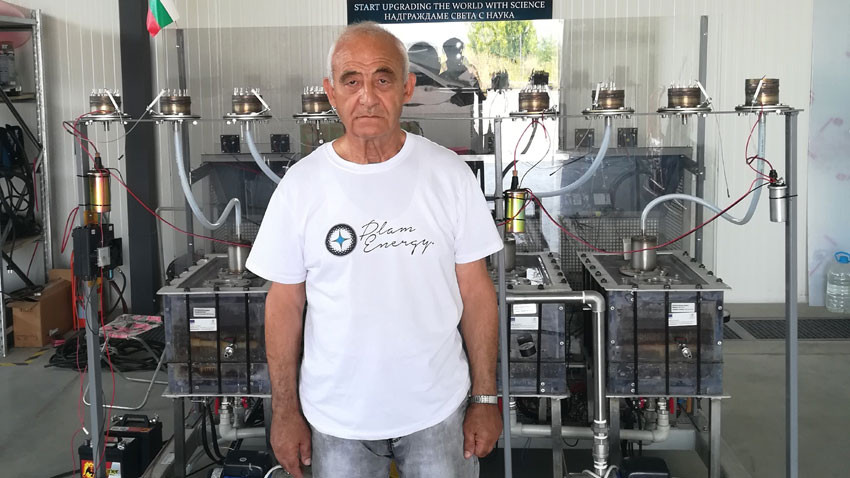"Created from water and turned again to water, producing clean energy” is the way Bulgarian Ilia Valkov described the so-called Brown’s gas. He is known as Australian scientist Yull Brown because he immigrated to Australia in the middle of the 20th century. There in the 1970s he was experimenting with producing oxyhydrogen from water through electrolysis, separating the water molecule into a mixture of hydrogen and oxygen at a ratio of 2:1. This gas mixture is also known as Brown’s gas and when ignited, it converts to water vapor and releases energy. The scientist, however, claimed to have found a method to use implosion characteristics of the gas for producing energy. The scientific community remained skeptical to these claims that contradict laws of thermodynamics and chemistry. Still, Brown’s gas has a number of applications and is used for metal cutting and welding.
Two Bulgarian scientists have recently developed and patented an installation for extraction of Brown’s gas and mineral deposits from seawater. With their project, funded under the "Innovation and Competitiveness" Operational Program in Bulgaria, engineers Chavdar Kamenarov and Plamen Kamenarov have achieved success in the field of renewable energy sources:

“Initially our goal was extracting energy from water, but in the process it turned out that extracted mineral deposits are more valuable than the gas itself,” engineer Chavdar Kamenarov says. "So, instead of getting energy, we received mineral resources. This is how the idea to use the gas in the process of extraction of minerals was born. We obtain these minerals in the form of sludge, extremely rich in polymetals.”
The interesting thing here is that the technology allows selective accumulation of certain metals at the expense of others. Another great advantage is that the technology does not pollute the environment but actually can be used to purify highly polluted industrial waters:
“In addition to extraction of mineral resources, clean drinkable water can be extracted from the sea,” Kamenarov continues. “At a later stage, the technology can be used as an installation for incinerating household waste and converting it into thermal or electrical energy. The very presence of Brown’s gas reduces toxicity but does not remove it completely and construction of air purification installations is required. In addition to the listed applications, the installation we have created can also be used for cleaning tailings ponds where extremely harmful radioactive waste is accumulated. Brown’s gas is successfully used in China to neutralize waste from nuclear power plants.”
At the end of September the invention will be presented in Plovdiv to the scientific community and industry representatives.
English: Alexander Markov
Photos: private library
The first Dalmatian Pelican of this season hatched a few days ago in the protected area Kalimok - Brushlen near the Danube town of Tutrakan, reports the Bulgarian Society for the Protection of Birds "BirdLife Bulgaria". The parents are taking active..
More than 4,000 participants from 52 masquerade groups from all over the country will take part in the Jamala National Masquerade Festival in Kyustendil on 15 and 16 February. A children's folklore procession will start from Velbazhd Square at 10.30 a.m...
With more 40 thousand archaeological sites and artifacts, Bulgaria is a true open-air museum. In terms of the number of finds, this country ranks third in the world after Italy and Greece. From the Neolithic, eight millennia ago, to..
Love blooms with renewed vigour every year on 14 February! Valentine's Day is increasingly being celebrated in Bulgaria as a holiday that inspires lovers to..
With more 40 thousand archaeological sites and artifacts, Bulgaria is a true open-air museum. In terms of the number of finds, this..
From February 14 to 16, an event under the motto "Love and Wine" will allow Sofia residents and guests of the city to combine the..

+359 2 9336 661
